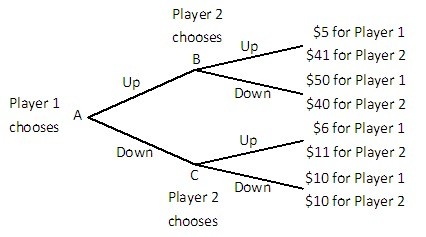In a two-nation, two-good world, if country A has the comparative advantage in producing good X over country B, then country A
A. could have the comparative advantage in producing the other good Y as well.
B. must have the comparative disadvantage in producing the other good Y.
C. should not trade with country B.
D. can produce good X with fewer resources than country B.
Answer: B
You might also like to view...
Player 1 and Player 2 are playing a game in which Player 1 has the first move at A in the decision tree shown below. Once Player 1 has chosen either Up or Down, Player 2, who can see what Player 1 has chosen, must choose Up or Down at B or C. Both players know the payoffs at the end of each branch.  If Player 2 could make a credible commitment to choose either Up or Down when his or her turn came, then what would Player 2 do?
If Player 2 could make a credible commitment to choose either Up or Down when his or her turn came, then what would Player 2 do?
A. Player 2 would commit to choosing Down. B. Player 2 would commit to choosing Up. C. Player 2 would not commit to choosing either strategy. D. Player 2 would commit to mimicking Player 1's strategy.
Which of the following would tend to decrease velocity?
a. an increase in interest rates b. more frequent paychecks c. expected decreases in inflation d. more efficient payment systems
In the short run with predetermined prices, when output is less than planned aggregate expenditure, firms will:
A. decrease planned aggregate expenditure. B. increase planned aggregate expenditure. C. increase production. D. reduce production.
Suppose velocity is constant, but real GDP is not independent of the money supply. If this is the case, a 10 percent increase in the money supply will:
A. have an unpredictable effect on inflation. B. raise inflation by less than 10 percent. C. raise inflation by more than 10 percent. D. raise inflation by 10 percent.